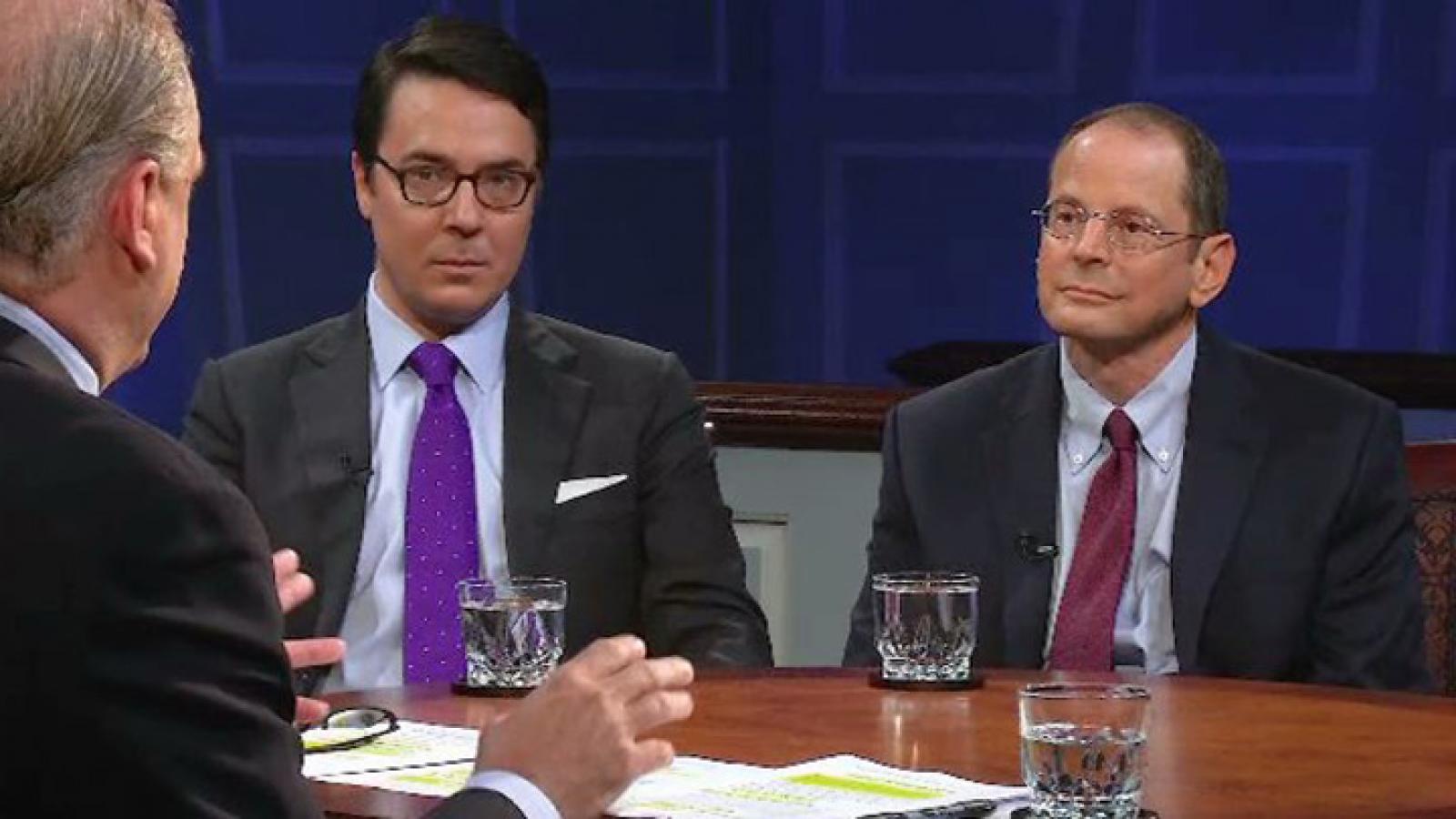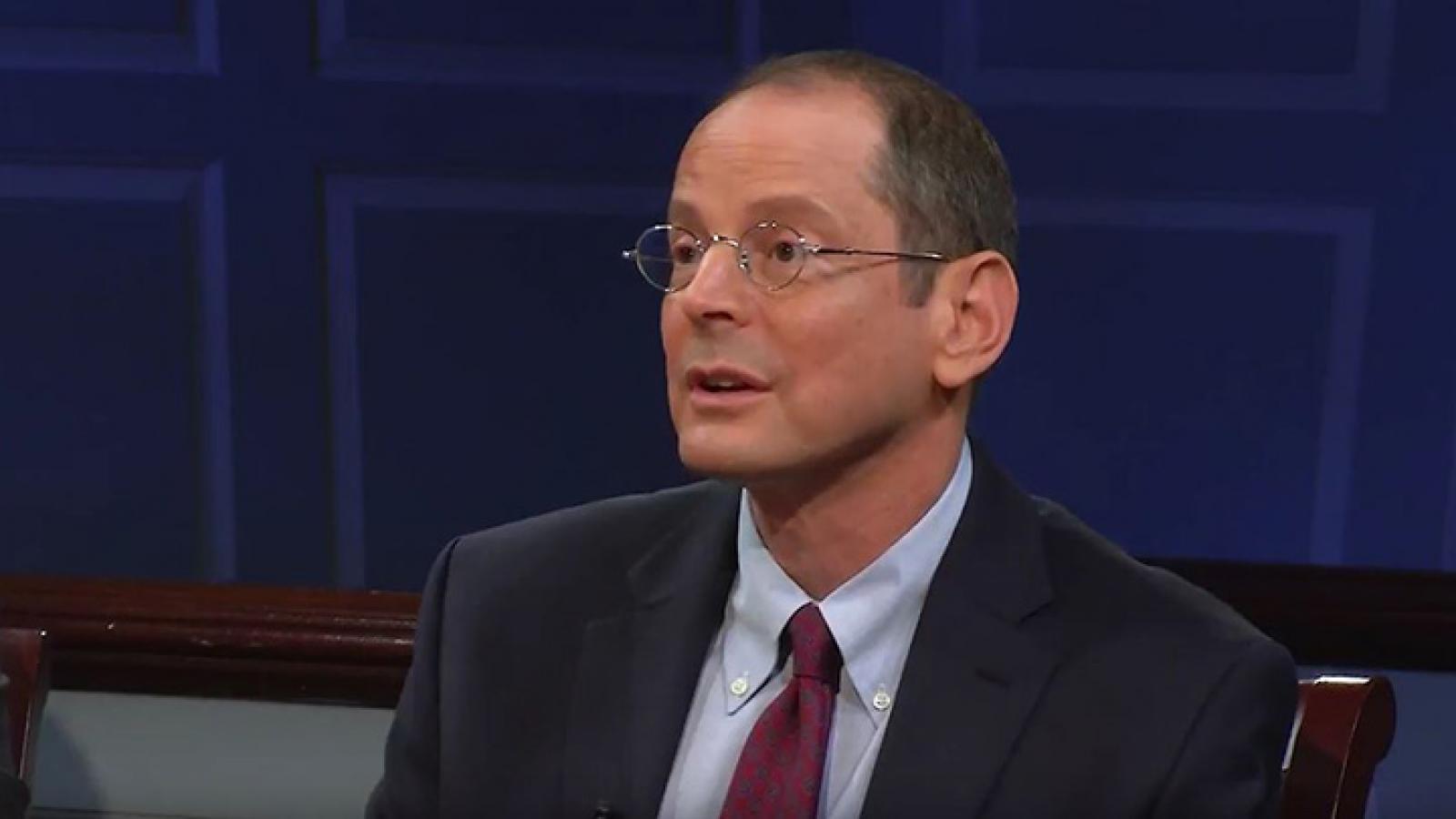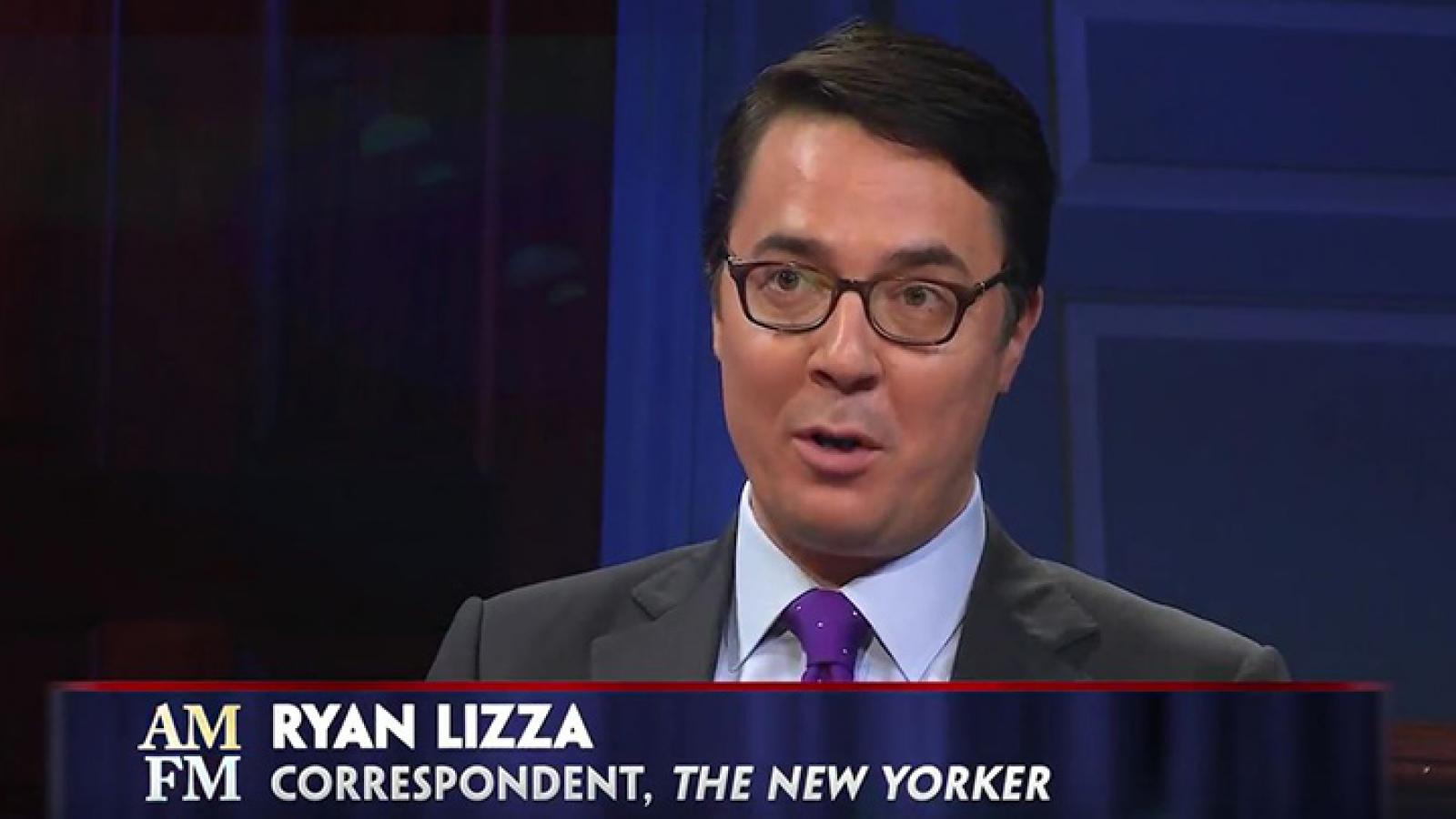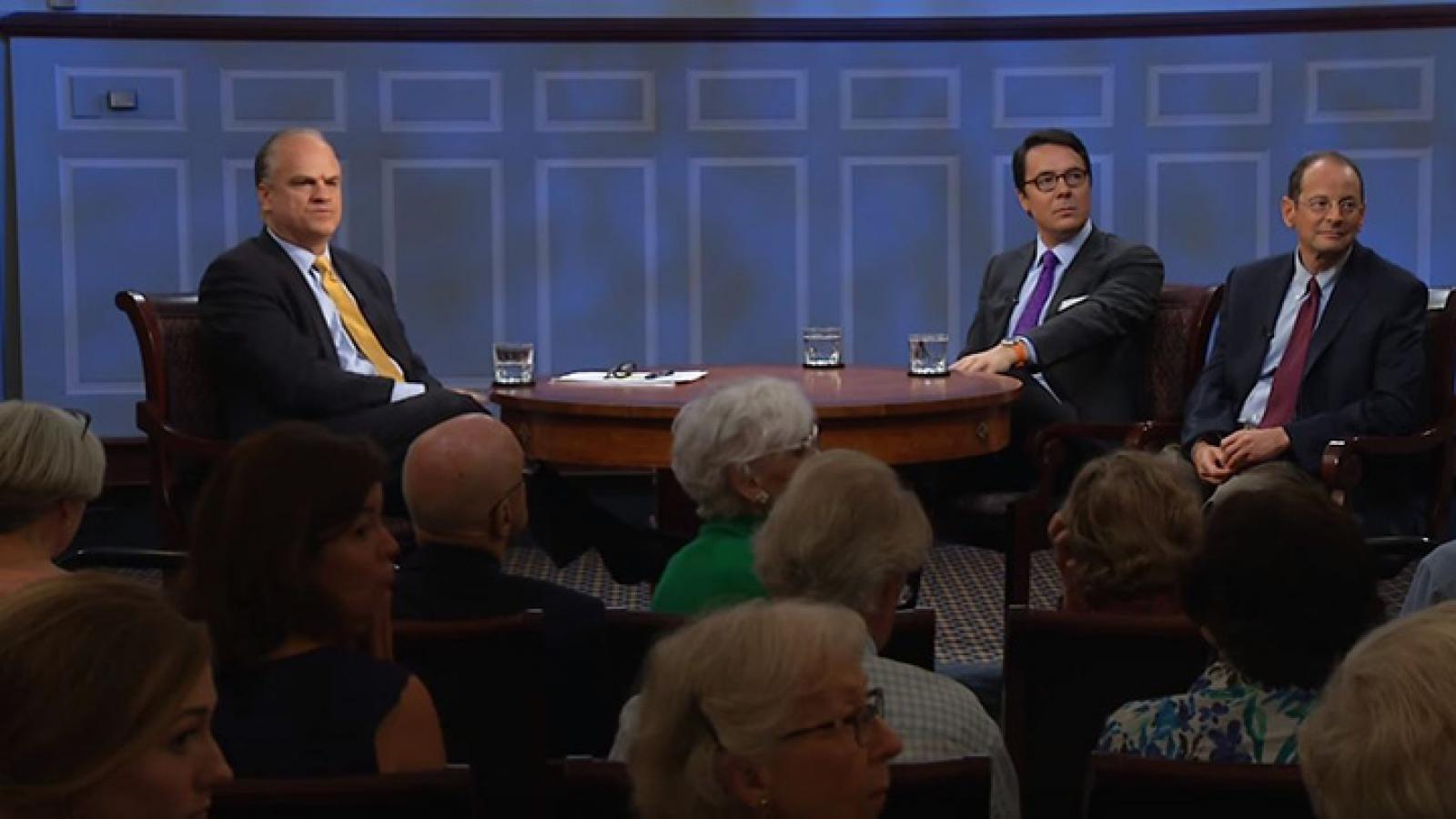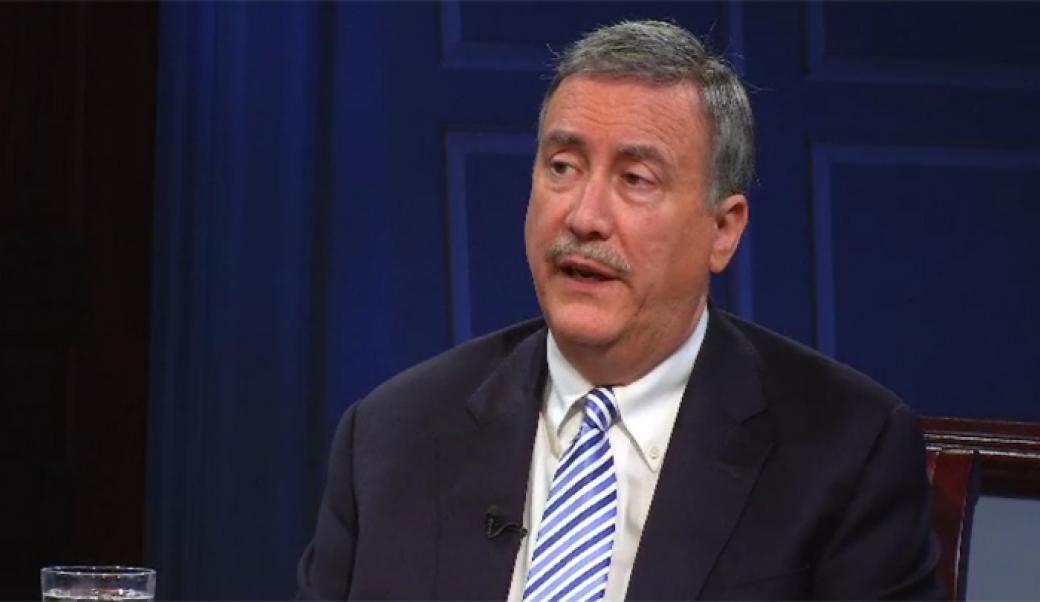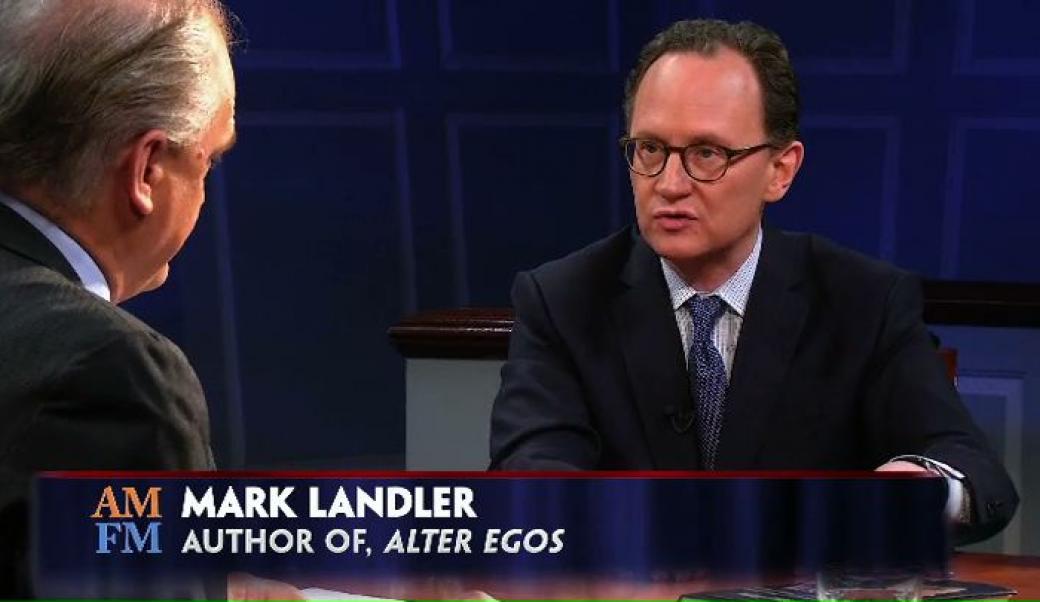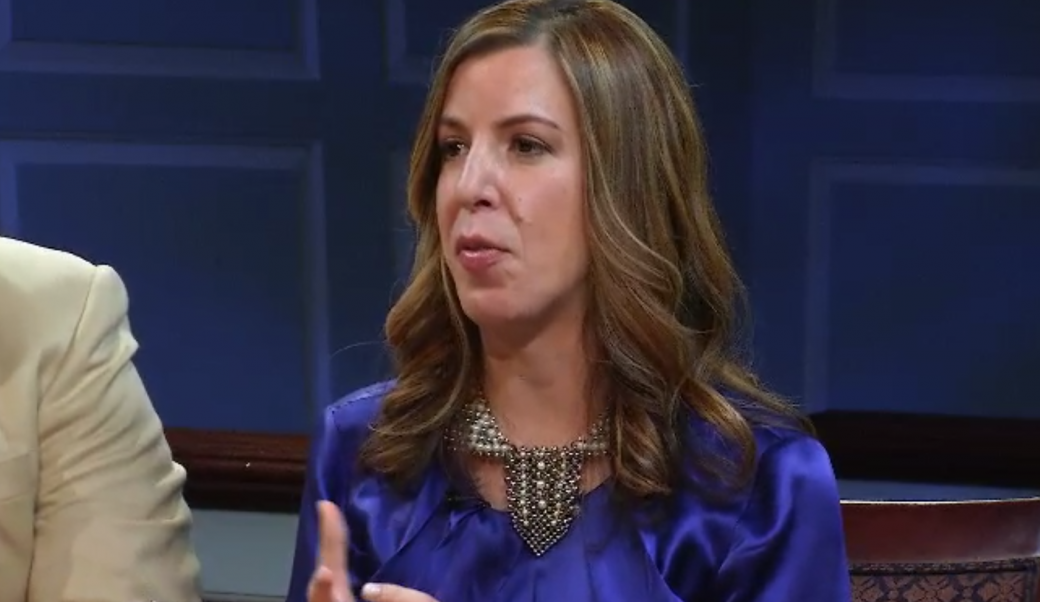About this episode
September 09, 2016
Jonathan Rauch and Ryan Lizza
Jonathan Rauch is a senior fellow at the Brookings Institution and the author of six books and many articles on public policy, culture, and government, including a recent piece in the Atlantic, "How American Politics Went Insane." Ryan Lizza is the Washington correspondent for the New Yorker and an on-air contributor for CNN. Together they discuss the our contemporary political culture.
Transcript
Doug Blackmon: Welcome back to a new season of American Forum. I’m Doug Blackmon. The next presidential election is less than three months away and one thing is clear in a deeply divided America, it can’t get much weirder than this. But it’s much more than just a strange year in which two deeply unpopular candidates won their party’s nominations. One of whom has been dogged by inexplicable mishandling of e-mails and allegations of past misconduct, while the other has stirred consternation and ire with remarks that many judge as deeply offensive and inflammatory. It’s clear, though, that something bigger than these problematic candidates is happening around us and may shape the contours of American democracy for a very long time. In the season ahead we’ll explore that question often through a new special series called “The Future of American Conservatism.”
FACTOID: The Question: Has our political system gone insane?
In today’s episode we turn to two insightful observers not just of the presidential horse race, but of the broad forces that work in American society that have produces this potentially historic moment of evolution in our democracy. Joining us are Jonathan Rauch a senior fellow at the Brookings Institution and also contributing editor of The Atlantic magazine, author of six books and many articles including a widely discussed piece this summer in the Atlantic titled “How American Politics Went Insane.” Also Ryan Lizza a senior editor and political correspondent extraordinaire at the New Yorker magazine. You also see him frequently on CNN. Thank you both for being here.
So John, in the piece that you wrote in the Atlantic that did get a lot of attention a lot discussion about it mapping out these bigger forces at work shaping the crazy political year we have had. One of the things you talked about was a kind of chaos syndrome and the idea that Donald Trump is not necessarily the instigator of the chaos that this presidential season appears to be, but more the product of of that that chaos or chaos syndrome, but what did you mean by that?
FACTOID: See theatlantic.com for Jonathan Rauch’s article
Rauch: Doug we’ve spent the last 40 or 50 years in politics systematically dismantling the structures that are needed to actually get things done in politics and government. These are things like machines and parties and intermediaries and bosses and political money and pork barrel spending and smoke filled rooms otherwise known as private negotiations.
FACTOID: In 2011, Congress banned earmark, or “pork”, spending
And you reach a point where you dismantle so much of that that it becomes very difficult to do even the basics of governing like keep the government open or pass a debt limit bill and it becomes impossible for parties to vet candidates anymore. So essentially you lose enforceable norms you lose party boundaries you get chaos and then you get Donald Trump.
Blackmon: Do you buy that Ryan? That the that the I mean obviously I think all of the things that John points out are accurate, but is it the, had there been a different cast of characters around the last few years? Could it be that some of the same reforms because most of the things you’re referring to have been thought of as improvements to the system and things meant to guard against undue influence. But but is is that the full explanation of Trump or has or is it that Trump takes it to a level that’s not quite justified, even by the by the reasons that you just laid out?
Lizza: Well first of all, Jonathon’s piece was one of the most thought provoking best political pieces of the last few years and sparked one of the best debates I think people have had about politics this cycle. Here’s the two…I’ve uh.. two of my uh two issues with it. One would be umm, I don’t think in the piece Jonathon placed as much weight as I would’ve on one of the parties. In other words, I don’t think it’s a you know the argument my argument is that there is a bit of false equivalence going on in Jonathon’s piece in that there is one party that has been more responsible for what you rightly point out or call chaos and that is the Republicans. And most of your examples about the debt limit and the inability to have a steady leadership in the house and not being able to negotiate a long term debt bill or fiscal bill with the president. That’s all stuff that happened on the Republican side and one party was not able to nominate a normal uh presidential nominee, the Republicans. The other side basically happened the way it usually does. The establishments and the elites that Jonathan bravely defends in this piece and I think rightfully so, um its sort of it’s it’s it’s working on the democratic side, it’s not working on the Republican side and I think you have to isolate the causes in the specifically in the republican party to explain as your, as the title of your piece Why Politics went crazy. That would be my one main caveat to your argument and I know you’ve heard this before so you’re probably well prepared.
FACTOID: PEW: 62 percent of Americans have unfavorable views of GOP
Blackmon: But to accept the general idea that Trump may be more a product of what has happened within the Republican party than creator. Most of these things in this sense that the system was beginning to rattle apart was already happening before Trump was being taken seriously at all.
Lizza: I agree with the very specifically how the Republican Party and both parties have done this opened up their primary uh nominating system opened the door for someone like Trump, and you know, most people will not agree with this but they over-democratized the primary system, right? There used to be a sort of you know failsafe switch if you were going to nominate someone like Trump the so called smoke filled room at the convention with the elites in the party could say you know what the voters have made a mistake here in the primaries, we’re not nominating someone who could beat our opponent, let’s nominate Paul Ryan or whatever. Those days are over and are never coming back.
Blackmon: And you also mapped out in the same piece the sort of historical sequence of events going back much further in time that are also in terms of the having too much democracy that that process begins almost a hundred years ago when we began to dismantle the electoral college as a way of a tempering force against the passions of the people so this process over the course of the 20th century that did change the system and make it increasingly democratic but also unleashed these…
Rauch: Yeah I reject the too much democracy sort of hip pocket description. I get why people say that but what were really talking about is how do we manage our democracy. And the way its set up by the Founders is it’s not plebiscitary it’s representative and you have a system of processes and that’s the people that don’t turn out in primaries which is a sickening 90 percent of the American public also get represented and then so you have enduring like parties that have to be accountable for governing and results over time. So it’s not a question of becoming too Democratic, its forgetting that we need intermediaries, brokers in the system that can actually get stuff done and when you decide all the things that they’re doing look like corruption we can do it without it well that’s when you throw the baby out with the bathwater.
FACTOID: About 28 percent of eligible voters participated in 2016 primaries
I completely agree with Ryan and I don’t think anyone seriously disagrees that the Republican Party is in worse shape than the Democratic Party. The distinction that I try to make is that the chaos syndrome is like losing your political anti-bodies, losing your immune system so that outsiders can come in and take you over. Well structurally I think both parties are in fairly similar positions unfortunately for the Republicans they have faced multiple attacks from outsiders, so they’re the ones who have been the most hit with this. But I also point out that the number two person in the Democratic race astonishingly was not a Democrat.
Lizza: Yeah
Rauch: And if it had been up to Democratic voters Bernie Sanders would’ve been out on Super Tuesday, just like that.
FACTOID: Sanders won 1,893 delegates, Clinton took 2,814 for nomination
So neither of the parties is able to defend its boundaries anymore reward its supporters disincentivise disloyalists, which means you get a lot of renegade politicians, you get a lot of sort of people who are self-recruited, who are in business for themselves, who owe no want nothing to anybody that’s Trump that’s Sanders Ted Cruz we’re going to see others of that type emerge in 2020.
Lizza: Yeah
Blackmon: You also talk about and I think this is one of the most original observations and maybe the most important observation in the whole in the whole article was the this idea that what has also been unleashed in the course of this process is a kind of political bigotry. The idea that were now in a time that it’s okay to just um bluntly say I can’t stand conservatives or I despise liberals and a kind of if you change those to racial terms and imagine people talking the same way it would obviously be offensive.
Rauch: The last form of bigotry in America which is universally acceptable which no one will even argue with. No its not gays, not blacks, its politicians and the political class. You can say absolutely anything no matter how deprecatory and false about a politician, people say they deserve it but in fact they don’t. It turns out that in a system where everyone hates politicians and won’t let the political class do what it needs to do, you get chaos.
Blackmon: And I think that’s an important explanation of why one of the greatest frustrations of the current time is that whichever side one may be on, it’s almost impossible to get anyone to agree on what simply is a fact. And so either side can present what may or may not be an actual fact but if you’re political bias or bigotry is that everything coming from the other side must be a lie or is questionable then you can never get to a place where you’re actually debating from reality.
Lizza: Yeah common said the facts is we’re losing the, I don’t know if we’ve ever had it but I think there was a time when we did, but we are losing the ability to have a common set of facts where both parties operate off of which is really kind of the premise for political negotiation in Washington.
Blackmon: If we could take the last nine months and the entire recording of Donald Trump’s last nine months and we were able to alter the time-space continuum and remove from those nine months maybe 10 minutes 15 minutes of the nine months uh then Donald Trump might well be a candidate who looked much more likely to become president of the United States.
Rauch: I’m not quite understanding the premise of the question if 10 minutes had been removed?
Blackmon: If we could because…
Lizza: You mean his worst statements.
Blackmon: If you took out a half dozen things that Donald Trump said…
Lizza: Oh oh you’re going to need more than 10 minutes 15 minutes (laughter). Because he repeats them.
Blackmon: Well that’s true.
Lizza: I know I know what you’re saying there are a few moments that have come to define him. Yeah.
Blackmon: But if he had not said Immigrants are rapists…
Rauch: I’ve got to push back on this one Doug, uh that’s way too horse racy for me, I have to put my cards on the table. I don’t think this is a partisan statement. Donald Trump is outrageously underqualified to be president of the United States. He is an unpredictable, narcissistic, sociopath um this is not someone that a conventional party would ever put forward partly because he’s going to lose. It’s not a question of this three things he’s said that shouldn’t have said. It’s a question of complete and total unsuitability for the office for which he is running. One of the things political insiders do for a living is you want to be governor of this state, your first campaign I look at you, maybe I’m a local boss I say, maybe you should run for schoolboard first or how about state legislature let’s see what you can do. And by the way let’s see what you can do for me, will you raise money for me? Will you be a good team player? Will you vote in committees to get stuff done? Then we will talk about governor. There’s a reason for that process as there is any of the rest of life, you don’t want sociopaths in high office who actually can’t do anything because they don’t owe anyone and no one owes anything to them. Well that’s Trump, that’s Sanders, that’s Cruz, that’s more and more people.
Lizza: If you had a normal Republican candidate yes, I think you’d have basically an even race. I mean the two big structural factors in the 2016 election is one very hard for the same party to control the white house three terms in a row so usually that will take a few points off of the Democratic Party because there is just exhaustion with the party in power and then two the biggest single factor in the presidential election is the economy. We have positive growth but you know everyone sort of agrees it could be it could be better, median wages are not what they should be. So you have an uphill struggle as a Democrat just given those two facts. You elect a Mitt Romney or just some normal traditional Republican and then add a third factor of course is Hillary Clinton’s own historic vulnerabilities, negatives she’s the most disliked or disapproved of nominee of a party except for Donald Trump right? He exceeds her on that. So, I do think it would be a dead even race, maybe a slight Republican advantage if they had nominated someone who wasn’t Trump. Almost anyone except I’d probably say Cruz.
FACTOID: WP/ABC: 56 percent of Americans now have unfavorable view of Clinton
Rauch: Um, Ryan is exactly right about the party, whatever that is, losing touch with a lot of voters. That’s what happens when you’ve got primary systems that are more responsive to outside groups than they are to insiders and politicians. Outside groups now can essentially spend unlimited sums of money in primary elections, and do. And you know a lot of that money wants to, you know, concern about the carried interest deduction. Um, so sure, they’re going to be out-of-touch. Uh, they’re losing the intermediaries who kept them in touch.
Blackmon: But what about that idea that there are really big demographic fundamentals to –
Rauch: Oh, sure.
Blackmon: That make almost any potential Republican candidate faces in this election or the last election or the next one, faces an uphill climb that from the beginning is what –
Rauch: I get that, I, I maybe I sound like a broken record here but there are always demographic changes. Parties are always coalitions of groups that profoundly disagree. Who was it, Will Rogers, who said, “I’m not a member of an organized political party, I’m a Democrat.” Um, this is always the core problem that a party needs to solve. How do you govern when you’ve got, essentially, all of these groups who don’t agree and who don’t get along? The job of all these organizers, these bosses and machines and the followers and the war-healers and the seniority system on Capitol Hill and all the, you know, subcommittee chairs. All of these people, their job is to find ways to herd cats. To get these people to work together. When you cut those people out, all you have left are the warring factions. So we know, it’s not that the warring factions are new, it’s that we no longer have the organizational capacity to deal with warring factions. So, I’m sort of claiming it’s a different kind of problem, and then people want to say, well, but look at the media’s changed, the world has changed, the parties have changed, you’ve got, you know, trade has changed. All of that is true. You’ve got to have mechanisms to deal with change.
Blackmon: You’re describing as structural devolution of sorts, and calling for a, an evolution to repair it. Uh, but when we’ve had those sorts of moments historically as we have, in many respects, it happens though because some group of people arrive at a, at a uh, at a plan for how to fix this or they start a new party or there’s shift of power within a party but there’s a, somebody has to do it, it’s not just an intellectual conversation like the one that we’re having. And so, who would do this, and does that suggest, and I think I would look at this and say, uh, that the most likely set of events in the future that would be responsive to all this is probably a split of the Republican Party. That something that the traditional Republicans break-off, you have, maybe we end up with something called the Republican Libertarian Coalition or something, but the, but it would have to be some sort of fairly dramatic structural event for there to be anybody to make the kinds of changes that you’re talking about. But does that make sense?
Rauch: I don’t know. Um, I’ve tried to think as hard as I could about, let’s suppose Trump is not president in January of next year. And then let’s suppose that there’s going to be an enormous argument within the ranks of Republicans over whose fault this is. Trump people will say we were stabbed in the back by the establishment and all the people who failed to endorse us, which hurt them. And the Paul Ryan people, the reformicons will say we didn’t have a positive agenda to bring to the American public. And the religious right and social conservatives will say you’re both wrong, you ignored our issues, our voters stayed home, that’s why we lost. and they will argue and argue. And whether that means the party splits or that means there is no functional party and we go into a period of kind of competing warlords, which I think could well happen or whether someone somehow manages to reconstitute enough structure to begin to create, you know, to put a tiller on the boat. I don’t know. I asked one of the smartest people who is a name brand Republican, and who knows a lot about what’s going on inside. I said “So what’s gonna happen?” And he said he didn’t have a clue. He said he and others would have to wait until the dust settled and dust themselves and look at where they are and then start having this conversation. And I said “Well suppose the conversation reaches a conclusion, is there enough organizational structure to do anything about it?” And he said, kind of like this, and he said “I don’t think so.”
Lizza: You know the one thing this discussion about how you bring back some of these intermediating institutions, all the things you talked about in your piece the sort of add-ons to the Constitution, things that weren’t in the Constitution, but that developed over time. And I just wondered, Jonathan, if there’s what can you point to can we ever go back to that? Because it seems to me that that era, you’re talking about a sort of very special period in American politics, the post war period where the parties were not sorted, they were not polarized the way they are and there’s just no going back. And I just wonder if there are reforms or if there’s anything you’d point to that could bring us back to that time. Because I look at Europe where you have strong parties, Parliamentary systems, and they’re experiencing the same changes we are, right? Brexit, Nationalist movements across Europe and you would think that some of those governments would be more like what you’re describing and yet the same thing is happening. And I wonder if maybe the issue is not the intermediating institutions, but the I don’t know the rise of inequality, you know that it’s more economic driven than political-
Rauch: Well it’s all of the above of course, but as a starting point a car without wheels won’t get anywhere. So the first thing you’d have to think about before you decide where you’re going is how to put wheels on the car. I’m not in favor of quote unquote going back. That’s not the way politics ever works. But what you can do is clear away some of the obstacles so that politicians can go back to what they will do if you just let them, which is things like before you run to office you better come talk to me ’cause I’ve got the money and I can dump it in your campaign or I can withhold it or I can give you that runway for your district or I can knock you off your committee seat if you misbehave or I have a lot of influence over whether you get endorsed in your next primary fight. Politicians do that naturally. You just have to let them. Mitch McConnell is doing that in the Senate right now, he’s a machine politician par-excellence. Just ask him. He’ll tell you. He has been very effective and made a point over the last two election cycles of protecting all the people who vote with him and they’ve been challenged in primaries, he’s won every single one of them. What he’s doing there is sending a message, which is “I can protect my people” which is the job of a party leader so you can “vote for me, and you’ll be safe”. So that’s one of the reasons the Senate seems to be functioning somewhat better than the House. So politicians, it’s not can you go back, it’s when you tear up the asphalt will the grass go back? And the answer is usually yes.
Blackmon: Let me ask a last question to both of you. We’ve been spending a lot of time over the past year on the question of what are going to be the most urgent issues that face the next president and what are the next ways that the president, whoever that may be can or should approach these most central issues. If you were, if you had that moment, two weeks after the inauguration and you were sitting down with either of them and you were giving them the benefit of the doubt that they actually wanted to know what you thought and they might actually act on it. Start with you Ryan. Just what would that capsule advice be to the next president?
Lizza: In terms of political reform or You know, I think most presidents don’t want to spend a lot of political capital on political reform, because it.
Blackmon: I’m gonna press you on this. You’re sitting there and you’re saying “Look, I know most presidents don’t wanna spend any political capital on reform, uh, but, I want you to be a great president, a president who will be remembered a century from now for how they responded to this moment in time.
Lizza: My advice would be the presidential system, as a lot of political scientists have long known, is always inherently unstable if the parties are completely polarized because you’re inevitably going to be pitting Congress against the president. This is why parliamentary systems don’t have that concern, right? So I would tell them that the single most important thing for you to do is make sure that Congress is controlled by your party. Because the only way to get things done right now in our modern system is when you have one party control in Washington. Everything works then, 2009, 2010 was an incredibly effective period when legislation actually got passed and problems were identified and solved. Absent that, there’s no magic political reform that will get our system working along the lines that Jonathan outlined.
Rauch: Yeah, I think I’m with Ryan on that, the whole search for magic bullets and the headline that fixes it is the wrong thing to do. It took us 40 or 50 years of working really hard and really gradually to get us to the state of chaos that we’re in now and it’s gonna take time to get back and it’s gonna take a lot of persuasion by people like me and hopefully soon, when he comes around, Ryan to get the public to start doing a rethink. As to your question, it matters who the president actually is, if it’s Trump I don’t think he can govern even if there is a Republican Congress, the party will be too divided. I think we’ll have chaos in government. If it’s Hillary Clinton, she’ll also have a hard time with at least one Republican chamber and I guess I’d suggest her to find a couple things that are doable. She won’t have an emergency, we think, which is a great advantage for an incoming president. Which means she might be able to pick one or two things, maybe it looks like tax reform that she can work on with Republicans in a constructive way and start to see if she can get some of the negotiations to start up again.
Lizza: Yeah, until compromise and negotiation is no longer a dirty word for both parties, nothing will get done in Washington and right now a core Republican belief is if you compromise with Democrats you have betrayed your principles and our government can’t run if that’s a premise.
Rauch: What he said.
Blackmon: Jonathan Rauch, Ryan Lizza. Thank you for being here, great piece in The Atlantic. Great conversation. All of us at American Forum hope you’ll continue this dialogue on the future of our democracy. That’s what we’re about, engaging with thoughtful citizens, encouraging strong opinions and equally strong commitment to civil, well-informed debate. We also hope you’ll join our conversation at the Miller Center Facebook page or by following us on Twitter at @DouglasBlackmon or @AmericanForumTV. You can also tweet our guests @RyanLizza and @Jon_Rauch. To send us a comment, watch other episodes, download podcasts or read a transcript visit us at millercenter.org. I’m Douglas Blackmon. See you next week.
